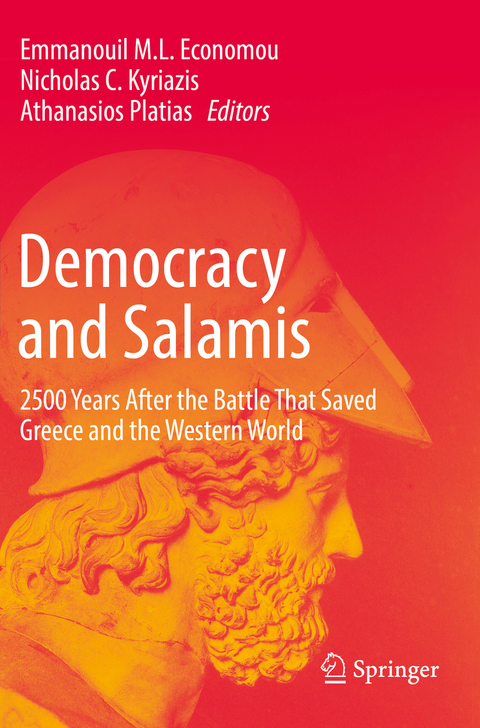
Democracy and Salamis
Springer International Publishing (Verlag)
978-3-030-98433-5 (ISBN)
In this book, well-renowned international scholars discuss topics related to various aspects of the history of the Battle of Salamis, inspired by the democratic origins of the Greek naval victory at Salamis. They present deductions from the battle that can be useful for today, and seek answers for a more prosperous and brighter future for our societies. Their analyses are divided into five parts in the book: 1) The democratic implications of the Battle of Salamis; 2) The strategies that lead to monumental naval victories; 3) The institutional implications of the Battle of Salamis; 4) Various societal aspects of the Athenian democracy; 5) The interconnections between two glorious battles: Thermopylae and Salamis.
This book is the first out of two edited volumes as a sequel of an international academic conference titled Salamis and Democracy: 2500 Years After that took place between October 3rd and October 5th, 2020, on the occasion of the 2500th anniversary of the great historical event of the Battle of Salamis, which saved Greek culture and the newly founded democratic regimes throughout the Hellenic world during the Classical period (508-323 BCE). The book is a must-read for scholars and students of history, political science, economics, and law, as well as policy-makers interested in a better understanding of classical, ancient, and political history, democracy, strategy, governance, and social choice.
lt;p>Emmanouil M.L. Economou is a lecturer at the Department of Economics, University of Thessaly (Greece). Further, he is a member of the Laboratory of Economic Policy and Strategic Planning (L.E.P.S.PLAN) at the University of Thessaly and a Member of the Laboratory of Intelligence and Cyber-Security, Department of International and European Studies, University of Piraeus (Greece). Economou's research focuses on economic history, institutional economics, international political economy, public economics, and defense economics. He is the author of several books published by Springer, Routledge, and others, as well as the author of numerous contributions in edited volumes. Further, Economou has published various papers in renowned peer-reviewed international journals such as Journal of Institutional Economics, Defence and Peace Economics, European Journal of Law and Economics, Economics of Governance, Evolutionary and Institutional Economics Review, Peace Economics, Peace Science and Public Policy and Homo Oeconomicus.
Nicholas C. Kyriazis is a Professor Emeritus at the Department of Economics, University of Thessaly (Greece). He served as the department's chairman between 2013 and 2015. Kyriazis holds a PhD in Economics from Bonn University (Germany). He has also been a visiting Professor at Harvard University and the University of Trier. Kyriazis has published various academic books, chapters in edited volumes, and papers in international, peer-reviewed academic journals. In 2005, the President of the French Republic honored him with France's highest decoration, the Knight of the Legion of Honor (Chevalier de la Legion d' Honneur) for his contribution to European integration and the preparation of the EMU as a member of the Delors-Moreau committee. Previous positions he held include, among others: Directorate-General for Research of the European Parliament, advisor to the government of the National Bank of Greece, and advisor to the Minister of Finance, Greece. He is currently a Vice-Chairman of the Greek Quality Assessment Committee of the Legislative Drafting Process.
Athanasios Platias is a Professor of Strategy and the Chairman of the Department of International and European Studies at the University of Piraeus (Greece). Previously, from 2008 to 2020, he served as the Director of the Graduate Program in International and European Studies at the University of Piraeus. Platias holds a Ph.D. in international relations from the Department of Government at Cornell University (USA). He has been a Ford Foundation Fellow at the Center for Science and International Affairs, Harvard University, a Research Fellow at the Peace Studies Program, Cornell University; MacArthur Fellow in International Peace and Security at the Program for Science, Technology and International Security, MIT and the Center for International Affairs, Harvard University. Prior to his tenure at the University of Piraeus, Platias taught for 18 years (1989-2007) at the Department of International and European Studies at Panteion University of Political and Social Sciences, Athens (Greece). Additionally, he held several senior policy advisory positions in various Greek Ministries during the last 30 years. His research focuses on grand strategy, geopolitics and geoeconomics, international security, theory of international relations, and international relations and strategy.Chapter 1. Introduction: Democracy and Salamis.- Part 1. The Democratic Implications of the Battle of Salamis.- Chapter 2. Herodotus on Rationality and Cooperation Before Salamis.- Chapter 3. Greece's Finest hour? The Democratic Implications of the Battle of Salamis.- Chapter 4. Salamis as Inflection point: Militarization, Politicization, and Democratization.- Part 2. The Strategies that Lead to Monumental Victories.- Chapter 5. Themistocles: Leadership and Grand Strategy.- Chapter 6. Salamis and Actium: Lessons From two Decisive Ancient Naval Battles in Greek Waters.- Chapter 7. The Legacy of the Battle of Thermopylae.- Part 3. The Institutional and Societal Implications of the Battle of Salamis.- Chapter 8. The Institutional Roots of a Naval Victory.- Chapter 9. The Battle of Salamis and the Democratization of Justice.- Chapter 10. Coping With Chronic Warfare. The Athenian Experience.- Chapter 11. Rowing and Democratic Memory: Salamis in Aristophanic Comedy.- Part 4. The Sociopolitical Background Before and After the Emergence of Democracy and the Battle of Salamis.- Chapter 12. Ancient Greek Political Science: Parochial or Universal? .- Chapter 13. The Emergence of Democracy: A Behavioural Perspective.- Chapter 14. Antigone, the Demos, the Law, and the Money.- Chapter 15. Honouring the War Dead in the Democratic Athens.
| Erscheinungsdatum | 06.08.2023 |
|---|---|
| Zusatzinfo | XII, 317 p. 9 illus. |
| Verlagsort | Cham |
| Sprache | englisch |
| Maße | 155 x 235 mm |
| Gewicht | 510 g |
| Themenwelt | Sozialwissenschaften ► Politik / Verwaltung ► Allgemeines / Lexika |
| Sozialwissenschaften ► Politik / Verwaltung ► Politische Theorie | |
| Schlagworte | ancient athens • Ancient Greek political science • Aristophanic comedy • Battle of Thermopylae • Chronic warfare • Democratic memory • Democratization • Demos • Emergence of democracy • Herodotus • militarization • Modern Greek state • naval battles • Persia • politicization • Strategy • Themistocles |
| ISBN-10 | 3-030-98433-8 / 3030984338 |
| ISBN-13 | 978-3-030-98433-5 / 9783030984335 |
| Zustand | Neuware |
| Haben Sie eine Frage zum Produkt? |
aus dem Bereich


